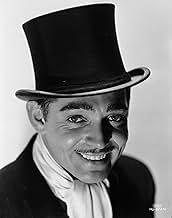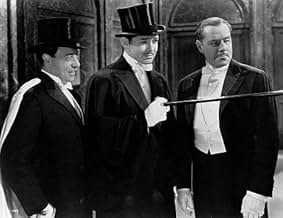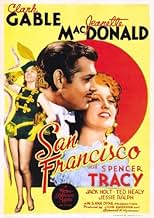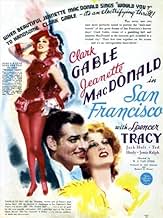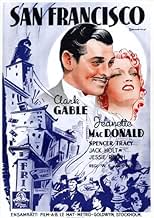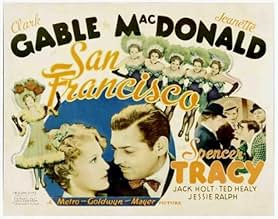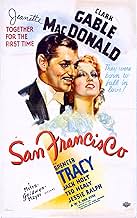AVALIAÇÃO DA IMDb
7,1/10
6,4 mil
SUA AVALIAÇÃO
Adicionar um enredo no seu idiomaA Barbary Coast saloonkeeper and a Nob Hill impresario are rivals for the affections of a beautiful singer, both personally and professionally, in 1906 San Francisco.A Barbary Coast saloonkeeper and a Nob Hill impresario are rivals for the affections of a beautiful singer, both personally and professionally, in 1906 San Francisco.A Barbary Coast saloonkeeper and a Nob Hill impresario are rivals for the affections of a beautiful singer, both personally and professionally, in 1906 San Francisco.
- Direção
- Roteiristas
- Artistas
- Ganhou 1 Oscar
- 5 vitórias e 6 indicações no total
Charles Judels
- Tony
- (as Charles Judells)
Warren Hymer
- Hazeltine
- (as Warren B. Hymer)
- Direção
- Roteiristas
- Elenco e equipe completos
- Produção, bilheteria e muito mais no IMDbPro
Avaliações em destaque
MGM's blockbuster was conceived originally as a vehicle for Jeanette MacDonald to co-star with some non-singing players while her normal screen partner Nelson Eddy was on a concert tour. Mr. Eddy always considered his screen roles secondary to his concert singing which was the reverse of how Jeanette felt.
According to a recent book about both Eddy and MacDonald, Clark Gable had been gotten out of romantic dalliance with some hush money MGM paid some woman off with. He didn't really want to do the film, but Louis B. Mayer kind of hammerlocked him into it. MacDonald however chose Spencer Tracy for the part of Father Tim Mullin, Gable's best friend and conscience of the movie.
Nevertheless the part of Blackie Norton, impresario of the Barbary Coast in 1906 San Francisco fits Gable perfectly. The man takes his pleasures where he finds them, but has a concern for the folks in his area who are getting the raw end of things from the upper crust on Nob Hill as personified by Gable's rival Jack Holt.
Gable and Holt are rivals for Jeanette MacDonald as well. She's fresh from the country, a parson's daughter with a great set of soprano pipes. Both like what they see, but Holt appreciates her voice quite a bit more than Gable at first.
Besides Ms. MacDonald, Gable and Holt have their differences over some of the rottenly constructed houses on the Barbary Coast and Gable wants a lot of new construction there. Of course the Earthquake of April 18, 1906 settles the whole issue of urban renewal.
If the special effects Oscar was around at that time, San Francisco would have won it for sure. Even over 60 years after the film came out and with the more modern techniques of special effects available, the sight of the earthquake is still visually stunning.
Gable and MacDonald did not get along on the set, Gable was more used to down to earth leading ladies like Crawford and Harlow. MacDonald and Tracy got along just fine. Her intercession with Louis B. Mayer changed the course of Tracy's career forever. Previous to San Francisco, Tracy played a whole slew of roughneck heroes in B films at Fox and his first few at MGM were in the same mold. As Father Tim Mullin, Tracy became the wise father figure (no pun intended) that the public came to know so well. He received his first Academy Award nomination for this part.
Jeanette has some operatic selections and three hymns to sing during the film, The Holy City, Battle Hymn of the Republic, and Nearer My God to Thee. She also got two original songs, Would You and the title tune of the film.
The song San Francisco was adopted by the city fathers of San Francisco as the city's official song. That is until Tony Bennett lost his heart there. Controversy still rages on the bay as to which should be the official song of San Francisco.
San Francisco made a whole lot of money for Leo the Lion that year. It in fact inspired Darryl F. Zanuck to burn down Chicago the following year so he could get in on that disaster epic box office.
San Francisco still holds up well today, the action, the music, and Spencer Tracy's groundbreaking performance. Something for everyone.
According to a recent book about both Eddy and MacDonald, Clark Gable had been gotten out of romantic dalliance with some hush money MGM paid some woman off with. He didn't really want to do the film, but Louis B. Mayer kind of hammerlocked him into it. MacDonald however chose Spencer Tracy for the part of Father Tim Mullin, Gable's best friend and conscience of the movie.
Nevertheless the part of Blackie Norton, impresario of the Barbary Coast in 1906 San Francisco fits Gable perfectly. The man takes his pleasures where he finds them, but has a concern for the folks in his area who are getting the raw end of things from the upper crust on Nob Hill as personified by Gable's rival Jack Holt.
Gable and Holt are rivals for Jeanette MacDonald as well. She's fresh from the country, a parson's daughter with a great set of soprano pipes. Both like what they see, but Holt appreciates her voice quite a bit more than Gable at first.
Besides Ms. MacDonald, Gable and Holt have their differences over some of the rottenly constructed houses on the Barbary Coast and Gable wants a lot of new construction there. Of course the Earthquake of April 18, 1906 settles the whole issue of urban renewal.
If the special effects Oscar was around at that time, San Francisco would have won it for sure. Even over 60 years after the film came out and with the more modern techniques of special effects available, the sight of the earthquake is still visually stunning.
Gable and MacDonald did not get along on the set, Gable was more used to down to earth leading ladies like Crawford and Harlow. MacDonald and Tracy got along just fine. Her intercession with Louis B. Mayer changed the course of Tracy's career forever. Previous to San Francisco, Tracy played a whole slew of roughneck heroes in B films at Fox and his first few at MGM were in the same mold. As Father Tim Mullin, Tracy became the wise father figure (no pun intended) that the public came to know so well. He received his first Academy Award nomination for this part.
Jeanette has some operatic selections and three hymns to sing during the film, The Holy City, Battle Hymn of the Republic, and Nearer My God to Thee. She also got two original songs, Would You and the title tune of the film.
The song San Francisco was adopted by the city fathers of San Francisco as the city's official song. That is until Tony Bennett lost his heart there. Controversy still rages on the bay as to which should be the official song of San Francisco.
San Francisco made a whole lot of money for Leo the Lion that year. It in fact inspired Darryl F. Zanuck to burn down Chicago the following year so he could get in on that disaster epic box office.
San Francisco still holds up well today, the action, the music, and Spencer Tracy's groundbreaking performance. Something for everyone.
As in the '70s, disaster films were all the rage in the '30s, with "Hurricane," "The Rains Came," "In Old Chicago," and, of course, 1936's "San Francisco" which certainly sent the other studios running to destroy anything they could. The film stars Clark Gable, Jeannette MacDonald, and Spencer Tracy as three citizens of that beautiful city on April 18, 1906, when the big earthquake struck.
Gable plays Blackie Norton, a quintessential role for him - a tough, charming rogue who runs The Paradise Club. MacDonald is the lovely and talented Mary Black who arrives there looking for work, and Spencer Tracy is Father Tim, who is Blackie's conscience (so he ignores him) and Mary's moral compass. Mary is torn between two loves - her love for Blackie and her love for opera. Burley (Jack Holt) wants her contract from Blackie so he can star her at the Tivoli Opera, but in all things, she suppresses her own desires so that she can stay with Blackie. She finally does leave but returns...only to leave again after an ugly confrontation between Blackie and Father Tim. Things get a lot uglier at an annual contest - and that's when the chandelier starts moving back and forth.
It's amazing what the films in the pre-computer age were able to do with special effects because the earthquake in "San Francisco" is dazzling, spectacular, and downright scary. Given the horrors of 9/11 and Katrina, one is drawn into the devastation and suffering as people search for loved ones, watch their houses fall, go crazy, and see their beloved city dynamited because there's no water to stop the raging fires. 70 years later, it's all way too close to home.
As good as he always was with Gable, Spencer Tracy did not have much of a role as the good father, but he's excellent. MacDonald poses a problem. Normally, she plays a diva or spitfire, and she did those roles beautifully. But Mary Blake is a modest and religious woman who speaks softly and sublimates her own desires for the man she loves. It doesn't ring true, and it doesn't work opposite the volatile Blackie of Gable's. If Mary had been more like other roles she played, MacDonald probably would have had good chemistry with him. As it is, they don't make much of a couple. Her singing is pretty until she hits the opera stage - with the combination of the tinny sound system in those days and the way women were trained on high notes then, the end result isn't good. She sings "The Jewel Song," which she often did in concert, the finale of "Faust," and "Sempre Libera." MacDonald was a lyric coloratura and suited to the demands of the opera stage in the '30s, but today she sounds dated as standards have changed.
This is a great film to see to appreciate the artistry of the early technicians. The effects in "San Francisco" hold up against anything that came 40 years later. The ending is pure Hollywood hokum, but very stirring. It gave this viewer goosebumps. Don't miss Hollywood at its very best.
Gable plays Blackie Norton, a quintessential role for him - a tough, charming rogue who runs The Paradise Club. MacDonald is the lovely and talented Mary Black who arrives there looking for work, and Spencer Tracy is Father Tim, who is Blackie's conscience (so he ignores him) and Mary's moral compass. Mary is torn between two loves - her love for Blackie and her love for opera. Burley (Jack Holt) wants her contract from Blackie so he can star her at the Tivoli Opera, but in all things, she suppresses her own desires so that she can stay with Blackie. She finally does leave but returns...only to leave again after an ugly confrontation between Blackie and Father Tim. Things get a lot uglier at an annual contest - and that's when the chandelier starts moving back and forth.
It's amazing what the films in the pre-computer age were able to do with special effects because the earthquake in "San Francisco" is dazzling, spectacular, and downright scary. Given the horrors of 9/11 and Katrina, one is drawn into the devastation and suffering as people search for loved ones, watch their houses fall, go crazy, and see their beloved city dynamited because there's no water to stop the raging fires. 70 years later, it's all way too close to home.
As good as he always was with Gable, Spencer Tracy did not have much of a role as the good father, but he's excellent. MacDonald poses a problem. Normally, she plays a diva or spitfire, and she did those roles beautifully. But Mary Blake is a modest and religious woman who speaks softly and sublimates her own desires for the man she loves. It doesn't ring true, and it doesn't work opposite the volatile Blackie of Gable's. If Mary had been more like other roles she played, MacDonald probably would have had good chemistry with him. As it is, they don't make much of a couple. Her singing is pretty until she hits the opera stage - with the combination of the tinny sound system in those days and the way women were trained on high notes then, the end result isn't good. She sings "The Jewel Song," which she often did in concert, the finale of "Faust," and "Sempre Libera." MacDonald was a lyric coloratura and suited to the demands of the opera stage in the '30s, but today she sounds dated as standards have changed.
This is a great film to see to appreciate the artistry of the early technicians. The effects in "San Francisco" hold up against anything that came 40 years later. The ending is pure Hollywood hokum, but very stirring. It gave this viewer goosebumps. Don't miss Hollywood at its very best.
San Francisco, like so many other films from this era, just reminds me again how movies today have lost the art of the build-up. They just hit you over the head with mind-numbing action from frame one. Hollywood(and audiences of today) would do well to watch classics like "San Francisco", where story takes precedence over special effects and when the effects do come, they are in service to the story. And they mean so much more and have so much more impact when held back until the last possible moment. Why can't we allow ourselves to be immersed in the story? Or are we just too impatient for it now?
This is a great old film. I have seen it several times, and enjoy it every time. I think Jeanette MacDonald is beautiful, and what a voice! I love to hear her sing.
My mother gave me my middle name of Jeanette after her. It is interesting that a film with so much "fancy" singing
could have been so popular. The general public must have had more class then than now.
It is good to see the "oldies." Many of them are better than today's films.
I certainly like this one.
My mother gave me my middle name of Jeanette after her. It is interesting that a film with so much "fancy" singing
could have been so popular. The general public must have had more class then than now.
It is good to see the "oldies." Many of them are better than today's films.
I certainly like this one.
I have just watched the colorized version of this knock-out film. Whether in color or B &W, it is a powerfully entertaining film. When Blackie Norton finds religion and Mary Blake spots him, humbled and on his redemption encrusted knees,tears well up in my jaded eyes. Everything works so wonderfully in this film. Still, as destructive and tragic as the earthquake scenes are,this movie is basically a love story and what male would not swoon over the voice and the innocence of Mary Blake. Certainly not me.
Você sabia?
- CuriosidadesClark Gable did not want to make this film but he was at the mercy of MGM studio head Louis B. Mayer, who had just paid off one of his numerous paramours.
- Erros de gravaçãoAs Blackie walks away from a building being blown up (actually a process shot), Clark Gable's head becomes momentarily transparent.
- Citações
Jack Burley: [referring to Mary Blake] Well, there's no law against an opera singer being slender, young and beautiful.
- Cenas durante ou pós-créditosPrologue: "San Francisco--guardian of the Golden Gate--stands today a Queen among seaports--industrious, mature, respectable. But perhaps she dreams of the Queen and city she was--splendid and sensuous, vulgar, and magnificent--that perished suddenly with a cry still heard in the hearts of those who knew her, at exactly 5:15 a.m. April 18, 1906."
- Versões alternativasAfter initial premiere, the manager of the Paramount Theater in San Francisco added to the downbeat ending a few shots showing the Golden Gate Bridge being built. Seeing the positive public reaction, MGM decided to have the sequence added to all other prints in release.
- ConexõesEdited into What Price Safety! (1938)
- Trilhas sonorasSan Francisco
(1936)
Music by Bronislau Kaper and Walter Jurmann
Lyrics by Gus Kahn
Played during the opening credits and often in the score
Sung by Jeanette MacDonald (uncredited)
Reprised by her and others at a political rally and at the end
Principais escolhas
Faça login para avaliar e ver a lista de recomendações personalizadas
- How long is San Francisco?Fornecido pela Alexa
Detalhes
- Data de lançamento
- País de origem
- Idioma
- Também conhecido como
- A Cidade do Pecado
- Locações de filme
- San Francisco, Califórnia, EUA(background footage)
- Empresa de produção
- Consulte mais créditos da empresa na IMDbPro
Bilheteria
- Orçamento
- US$ 1.300.000 (estimativa)
- Tempo de duração
- 1 h 55 min(115 min)
- Cor
- Proporção
- 1.37 : 1
Contribua para esta página
Sugerir uma alteração ou adicionar conteúdo ausente


